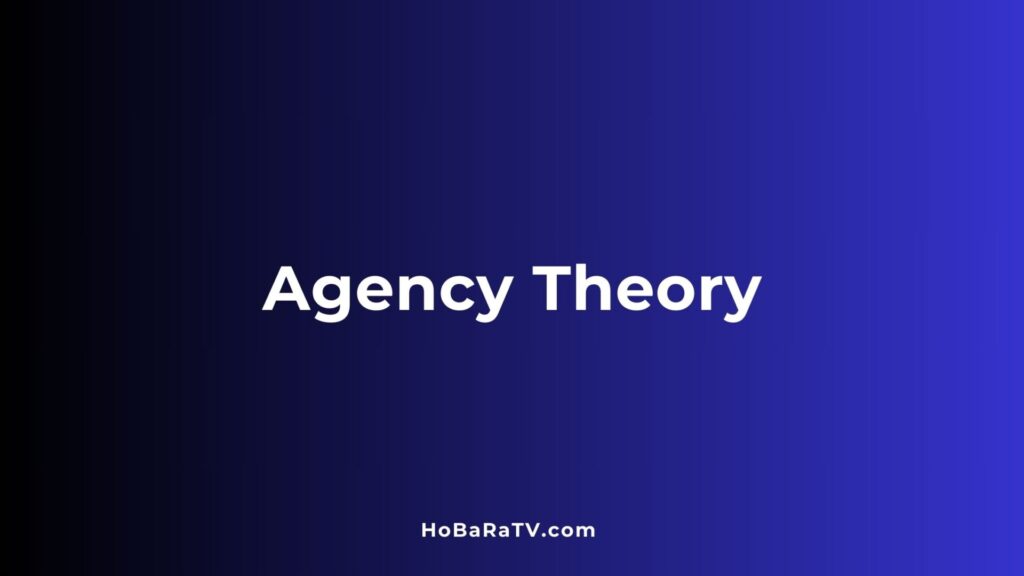Agency theory is a cornerstone concept in financial management, economics, and organizational studies.
It examines the relationships between principals (such as shareholders) and agents (such as company executives).
This theory highlights potential conflicts of interest that can arise and provides frameworks for resolving these conflicts efficiently.

What is Agency Theory?
Agency theory describes the dynamic relationship between individuals or entities in a principal-agent arrangement.
The principal delegates authority to the agent to act on their behalf, often with the expectation of maximizing returns.
However, this delegation comes with challenges, as agents may prioritize their interests over the principal’s objectives.
For example, in a corporate setting, shareholders (the principals) hire executives (the agents) to run the company.
While shareholders seek to maximize profits and shareholder value, executives might focus on personal goals, such as increasing their compensation or pursuing projects that enhance their reputation.
The Core Problem: Agency Conflicts
Agency conflicts arise when there is a misalignment between the principal’s and agent’s goals.
These conflicts typically stem from two key issues:
Information Asymmetry: Agents often have more information about their actions and decisions than principals, creating an imbalance of power.
Moral Hazard: Agents might act in their self-interest, especially if their actions are not closely monitored.
For instance, an executive may invest in a high-risk project that benefits their reputation but exposes the company to unnecessary financial risks, contrary to shareholders’ risk preferences.
Addressing Agency Conflicts
To mitigate agency conflicts, organizations adopt various mechanisms that align the interests of principals and agents.
These include:
Incentive Structures: Linking agent compensation to company performance, such as through stock options or bonuses, ensures that agents work towards the principal’s goals.
Monitoring Systems: Boards of directors, audits, and performance reviews help reduce information asymmetry and ensure accountability.
Contracts and Governance: Detailed contracts outlining expectations and corporate governance frameworks reduce the scope for conflicting interests.
For example, if a company ties its CEO’s bonus to the firm’s profitability, the CEO has a direct incentive to focus on actions that enhance shareholder value.
Application of Agency Theory
Agency theory has practical implications across various domains. In finance, it underpins corporate governance strategies, merger decisions, and investment choices.
For instance:
Corporate Governance: A strong board of directors can monitor management effectively, reducing the likelihood of self-serving behavior by executives.
Investment Management: Mutual fund managers (agents) are expected to act in the best interests of investors (principals) by making prudent investment choices.
Why is Agency Theory Important?
Understanding agency theory equips businesses and investors to navigate complex principal-agent relationships effectively.
By identifying potential conflicts of interest and addressing them proactively, organizations can enhance trust, improve decision-making, and achieve better financial outcomes.
For example, a venture capitalist investing in a startup might use agency theory to structure agreements that align the entrepreneur’s goals with the fund’s long-term profitability.
Final Thoughts
Agency theory provides valuable insights into the dynamics of principal-agent relationships.
By recognizing and addressing agency conflicts through incentives, monitoring, and governance, businesses can foster cooperation and achieve mutually beneficial results.
This theory is not just a theoretical framework; it is a practical tool for enhancing organizational effectiveness and aligning stakeholders’ interests.
Disclaimer: The information provided on this website is intended for educational and entertainment purposes only. It should not be considered as professional advice or a substitute for consultation with a qualified professional. Always seek the guidance of a licensed expert in the relevant field for advice tailored to your specific circumstances. The creators of this site assume no responsibility for how the information is used or interpreted.
Quick Links: You can visit financial literacy terms beginning with letters A, B, C, D, E, F, G, H, I, J, K, L, M, N, O, P, Q, R, S, T, U, V, W, X, Y, Z, NUMERICAL, and Glossary